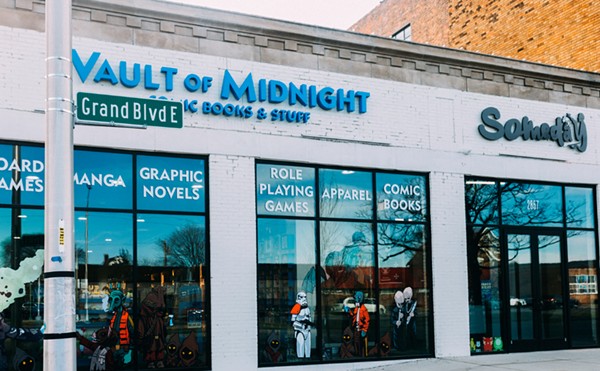The focus of the second annual Italian Film Festival/Great Lakes (at the Michigan Theater in Ann Arbor today-Saturday) is writer and director Francesco Rosi, whose films serve as a bridge between 1940s neorealism and contemporary Italian cinema. Eleven of Rosi's films will be shown during the festival, including his latest, The Truce, at 7:30 p.m. Thursday.
After studying law and working in radio in his native Naples, Rosi began his film career as an assistant to Luchino Visconti, whose films helped define Italian neorealism. This socially conscious genre focuses on the plight of the Italian underclass and utilizes a raw, documentarylike visual style, location shooting and, often, a nonprofessional cast.
Some of Rosi's films -- like 1958's The Challenge (5:15 p.m. Thursday), about a highly ambitious, small-time criminal -- are visibly influenced by neorealism. But even as Rosi's visual style changed, his subject matter remained decidedly politicized. In films such as 1963's Hands Over the City (9:15 tonight), about political maneuverings following a tenement building's collapse, and 1976's Illustrious Corpses (9:30 p.m. Saturday), in which a detective investigates a killer who strikes members of Italy's judiciary, Rosi examined the ingrained culture of corruption in Italian society.
More Than a Miracle (6 p.m. Friday) is a 1967 departure, a lush period fantasy starring Omar Sharif and Sophia Loren. But Rosi is better known for 1980's Three Brothers (8:30 p.m. Friday), in which a funeral draws disenchanted, urbanized brothers back to their family's farm.
The festival also showcases Rosi's complex and stylistically fractured (sometimes described as "cubist") biographies: 1973's Lucky Luciano (4 p.m. Saturday), 1972's The Mattei Affair (10:45 p.m. Friday), about an enigmatic industrialist, and 1961's Salvatore Giuliano (7 tonight), which follows a Sicilian bandit-folk hero.
The Truce is a companion to 1970's Just Another War (5 p.m. today), where soldiers battle officers in a class conflict during World War I, and 1979's Christ Stopped at Eboli (6:15 p.m. Saturday), about a leftist's exile in a mountaintop village during World War II.
Based on the 1963 memoir (published in the United States as The Reawakening) by chemist-turned-author Primo Levi -- who also wrote The Periodic Table, The Damned and the Saved and other works before his 1987 suicide -- The Truce traces Levi's grueling physical and psychic journey from Auschwitz to his home in Turin.
This odyssey is harrowing, but tinged with absurdist humor. Levi (a haunted John Turturro) gains a mentor in a streetwise Greek (Rade Serbedzija), spends time with other refugees in a Russian-run resettlement camp and travels through eastern Europe on foot -- farther and farther away from Italy -- in order to find a train whose tracks weren't destroyed.
Francesco Rosi creates some indelible images, but he gets tripped up by language. By filming The Truce in English, Rosi glosses over the very basic struggle of differing -- and not necessarily cooperative or friendly -- ethnic groups to communicate, particularly in chaotic postwar Europe. (Another problem is that some of the actors' accents are nearly impenetrable.)
But this said, The Truce also contains some truly amazing sequences. As the film opens, the Nazis have retreated from Auschwitz, taking the healthy with them and leaving the sick locked up to die. What seems like an apparition -- men on horseback -- appears on the other side of the barbed wire. Are they knights in shining armor or the four horsemen of the apocalypse?
They're actually Russian soldiers, who pull down the camp's gate. A muted euphoria slowly spreads among the concentration camp survivors. They gratefully walk out of Auschwitz, only to retreat back into their prison when they spy tanks, trucks and other soldiers coming over a hill. This charged scene says more about psychological torture than all of The Truce's heavy-handed voice-overs (which seem to presume that the audience is completely unfamiliar with the horrors or importance of the Holocaust).
Later on, Primo Levi listens in stunned silence as a fellow survivor, a thief, claims that he -- not Jewish or involved in the anti-fascist movement like Levi -- was the only "innocent lamb" at Auschwitz. This simple statement, which has the power to chill the blood, proves that in The Truce's best moments, less truly does become more.
Francesco Rosi will be in attendance after The Truce and More Than a Miracle and will also participate in the roundtable discussion, "Political Cinema: Agent for Social Transformation and/or Postwar Cultural Catharsis" (3 p.m. Friday). Call The Michigan Theater at 313-668-8397 for more information.
Serena Donadoni writes about film for Metro Times. E-mail her at [email protected].





